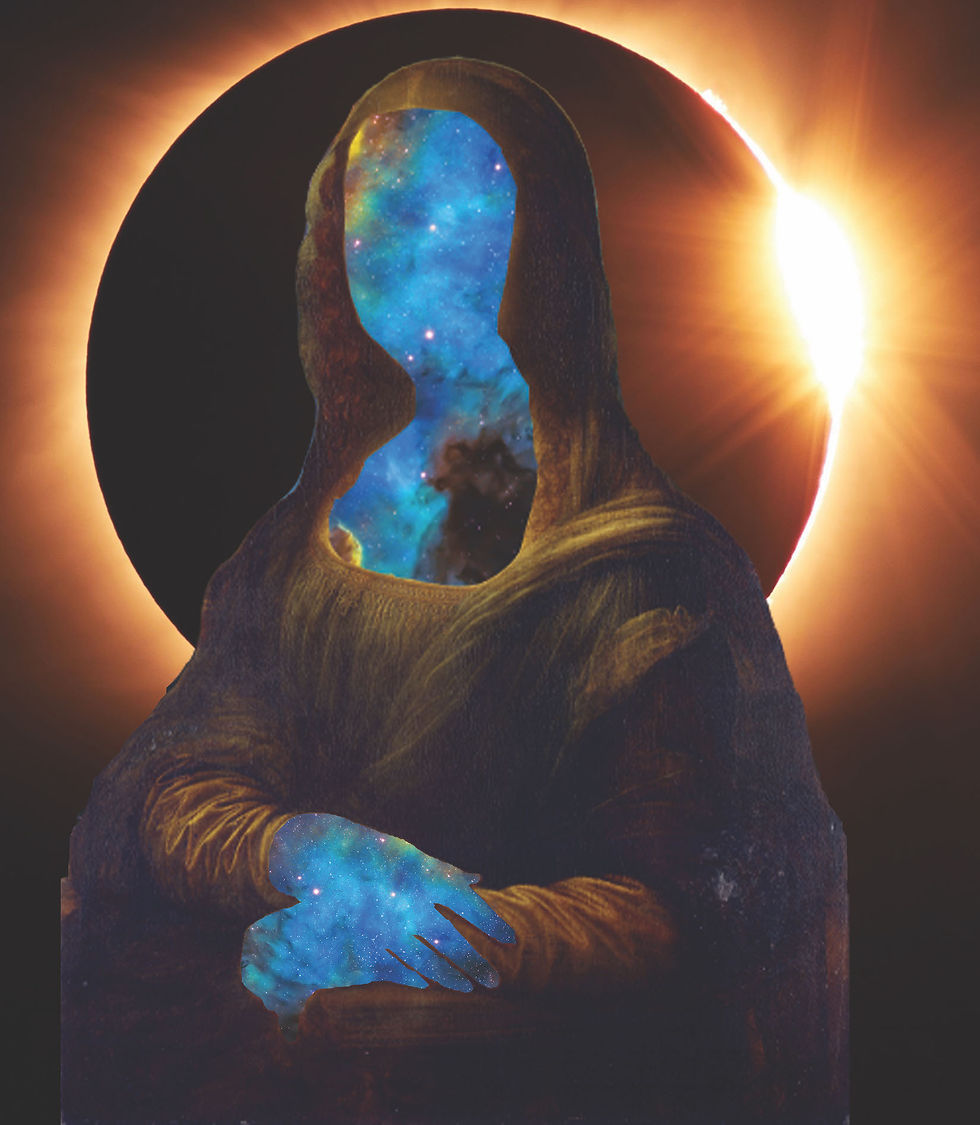On the Verge
- d.k. spencer

- May 10, 2022
- 4 min read

Mona Lisa, Mona Lisa
Collage by D.K. Spencer
Star Dust
It's easy to forget where we come from since we really don't know where that might be. We’re made from the same stuff that makes up the Universe but we tend not to dwell on this. We'd rather busy ourselves with the day-to-day crush, to distract ourselves from what's really gnawing at us. It's just easier.
The Universe Is Expanding and So Are We
As our discovery of all things expands exponentially, we're becoming more self-aware on a global scale. And that's never happened before.
For instance, our understanding of the way our minds work--the social implications of how we think of ourselves and talk to each other, is redefining the boundaries of tribalism. Discovering all of the nooks and crannies of our planet, mapping them at an incredible rate, changes how we feel about where we live. We are awakening to just how small our planet really is--when contrasted to just one hundred fifty-eight years ago, when Jules Vern first published Journey to the Center of the Earth.
Today our technology is likely fifteen, twenty, maybe thirty years more advanced than most of us realize. A new gadget shows up on marketplace and zoom, were off in another direction, trying to catch up with its implications. It's likely transforming our way of life, promising ease and convenience while sliding two more existential problems into our daily lives never before imagined. All of this without conversation or debate.
As the real estate of our lives is divided into smaller and smaller parcels, and the pixels on our screens become more acute, our attention becomes more focused and less generalized, which invariably causes us to drift farther and farther apart--much like our beloved Universe, where star clusters are continually drifting away from each other like protagonists in a French tragedy.
Time = Life
No longer can we ask important questions about life. We just don't have time. We're too distracted, absorbed within the details of next paradigm de la dia. And that's why time is an important concept to understand. For you and me, it's finite.
Time makes most of us uncomfortable, and we’ve little understanding why? In science fiction, the concept of time piques our imagination because it’s ripe for philosophical musings, allowing us to view the invisible.
Whether The Matrix, where time is bent, keeping one from seeing a true reality, or In Time, where time is scarce, treated more like a commodity; time is the constant of our Human condition.
Thea von Harbou's 1925 Metropolis, uses a clock to symbolize the mechanization and measurement for human energy. As long as humans keep the clock running and the machines producing, all was well. Never mind the overlord. Time is represented as a continuum. It's a medium for which a few control the many. The paradox is our survival depends upon it, so tearing down the machine = mutually assured destruction.
With H.G. Wells’ 1895, The Time Machine, time is a medium for travel, making it possible for us to tour the societal divide between the Morlocks, who run the machines, and the Eloi, who have boodles of time on their hands. In a twist, the Eloi must rely on the Morlocks to run a tight work-shift producing energy, who in turn rely on the Eloi come feeding time. So time is two layered here. In one sense it's a substance, in another it's luxury with a cost.
Coincidence and Convergence
Many new science fiction stories of late are concerned with the same topics I often try to articulate in my own work. I'm struct at how the themes over time, from Jules Vern to Jeff VanderMeer, remain mostly unchanged.
Whether we take our problems out into space, or confront obstacles here on this planet, we are faced with finding solutions to age old problems.
Why is this, do you suppose?
I think it's because these problems reside inside us. We are the problem. How we think is the problem. How we view everything from outside of our own skin is the problem.
So naturally we aren't likely to find solutions outside of ourselves, when the answer involves deep introspection. And that means recognizing that we are all made of star dust. We all have the Big Bang inside of us, bursting and expanding, creating dark matter and light.
Until we can see ourselves as we truly are, we cannot identify the root cause of all problems. And so, if we cannot describe our fundamental problems, then neither science, nor religion, nor politics, nor any of us will make the significant changes necessary to move in a more positive direction.
Why? Because we're all thinking about the same things. We're all stewing on how to describe where we are in this present day, where we might go, and how we might maintain our planet's well being. After all, it's the only one we have. We're beginning to understand that we don't have the luxury of time. And this makes for exciting stories, better realized then imagined. We have the capacity to fundamentally change, to alter our trajectory.
Our understanding and study of who we are and how we interact with each other and how we treat the Earth determines our destiny. We only have one planet and that fact unites us--like it or not. Through empathy and understanding will we emerge stronger and more resilient to an ever changing future that can only become better when we understand we are all star dust, we are each other. If I hurt you, I hurt me. We are not separate, we are the Universe. We are each other.




Comments